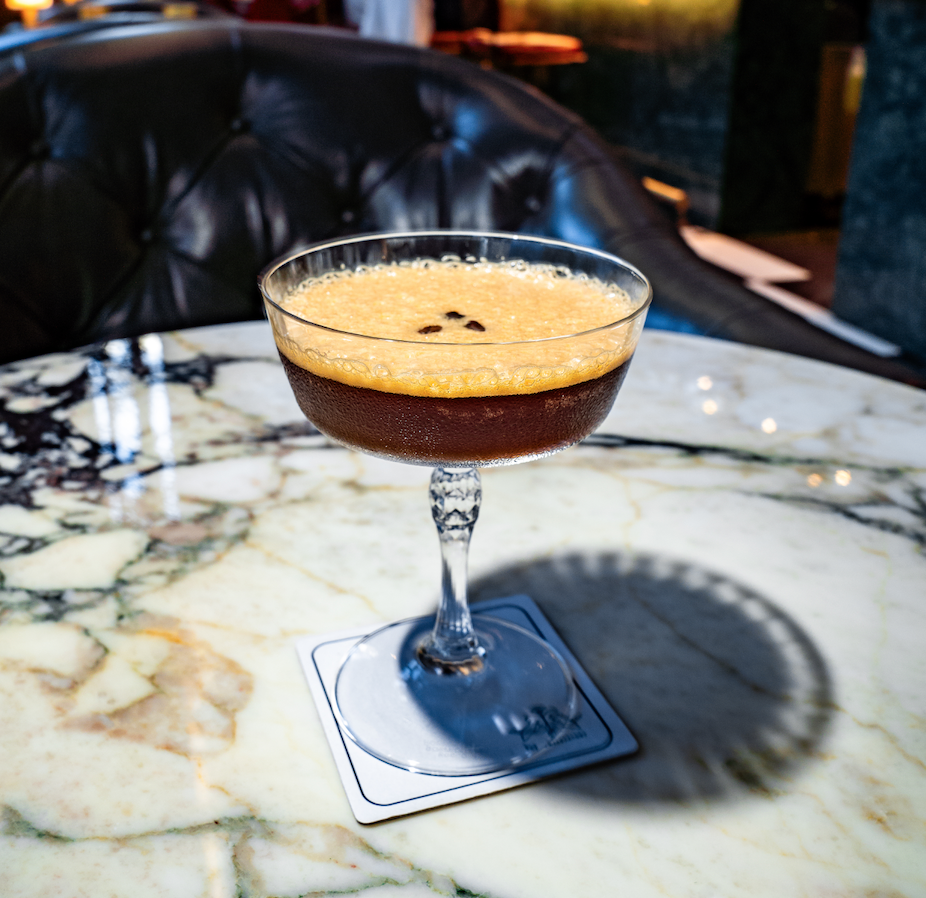By Matthew Stoss
“What is it,” Luke Barr wonders, “about the hotel bar?”
I’m wondering, too, and that’s why I’ve asked Barr, a pro, to vamp about the romance and allure of hotel bars. He’s a former editor at Travel + Leisure magazine and the author of 2018’s Ritz and Escoffier: The Hotelier, The Chef, and the Rise of the Leisure Class. It’s a book about how at the end of the 19th century Swiss hotelier César Ritz and French chef Auguste Escoffier created the modern hotel experience and, in a way, the modern hotel bar.
“You sort of feel like you’re enveloped in this slightly separate world, the world of the hotel,” Barr says. “Anything can happen.”
That helps make hotels and their bars reliable settings for novels, films, and our imaginations. Certainly mine. They’re pocket universes where rules, inhibitions, and even personalities can be fudged. Muster (or feign) unusual confidence through a persona or an alter ego or just a version of yourself that doesn’t get much use back in Ohio. I just think we’re all a little more interesting at a hotel bar.
“It’s a public private place. There’s a kind of glamour attached to that,” Barr says. “It’s the liberation of travel—the feeling that rules don’t apply, the feeling that you could strike up a conversation with anyone, and who knows who they might be?”
Barr and I chatted about this after I took myself on a date to see what it is about hotel bars … in Charlottesville. On a June Thursday night, I moseyed between six such venues to absorb ambience, drink extravagantly, and, hopefully, be your muse.
I had joked that I was out to meet a kindly dowager with a thing for blue-eyed writers. (We’re always looking for patrons.) That didn’t happen, though my vanity still believes it could have. I also would have settled for true love.
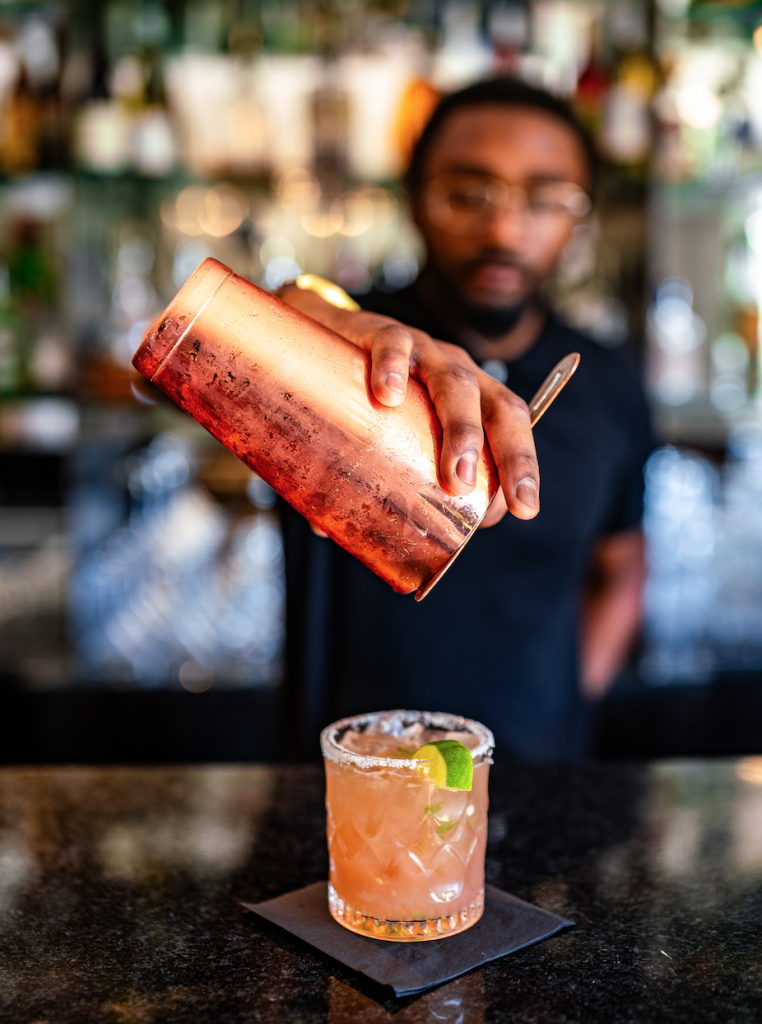
At the Oakhurst Inn’s Château Lobby Bar, she’d probably have shorter bangs and a lovely sense of Francophilia. The bartender here has crossbred a French 75 and a Tom Collins to produce an unnamed-but-refreshing gin cocktail. I pretend it appears on a secret menu and set its coupe glass next to a complimentary print edition of The New York Times. I’m not sure what my persona is tonight but I tell myself it’s intriguing. When there isn’t live jazz at the piano, there’s Billie Holiday on a playlist. I bet someone’s got a cloche hat in the lost and found.
I can’t say what Ritz and Escoffier would’ve thought of the Oakhurst—I bet Barr could, but he’s in New York—but I’m 49 percent sure they would have recognized Kimpton The Forum Hotel. The lobby bar, The Aspen, has a benign grandeur that softens after dark. Because of the bar’s riff on a Corpse Reviver No. 2, I shall be infusing my own gin with chamomile. I’m sure I drank with at least one consultant, but I’d stay up late here to look for a furtive glance.
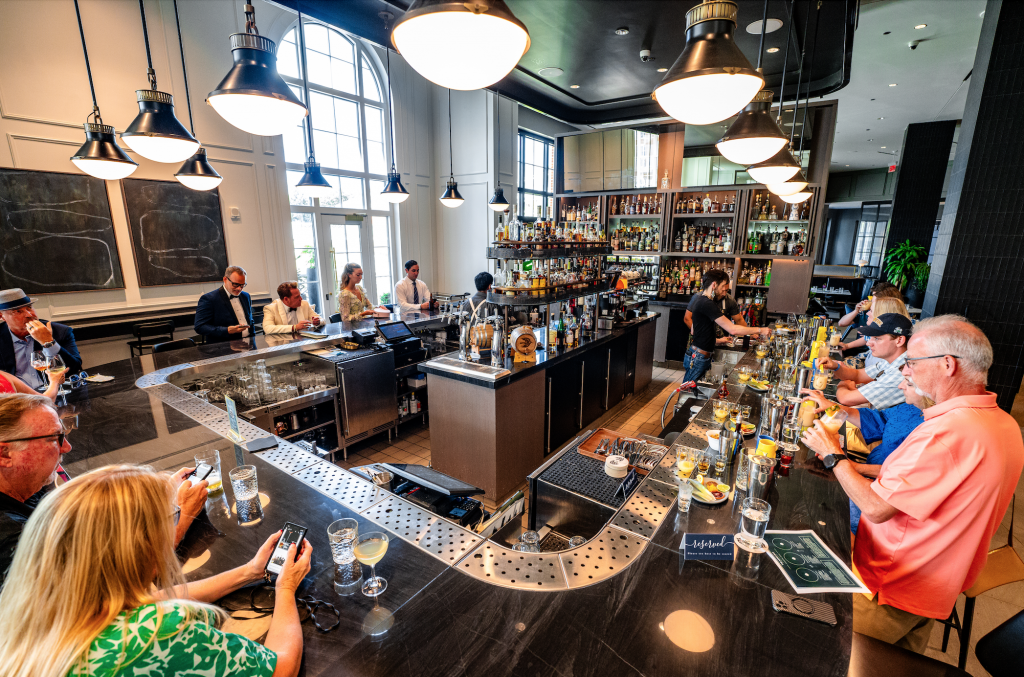
Away from the airy ceilings and window walls of the lobby is The Forum’s second bar, The Good Sport. It’s cozier, dimmer, and appears to have had its golf course amputated. I have a shot and a beer and adjust my persona. The singing bartender’s mission statement is “I’m here to blow minds” and he claims to be the “last honest bartender” in town. It’s unclear what he means by that but we’re entertained nonetheless. He’s as subtle as a t-shirt cannon, but charismatic hotel bartenders have a lineage and are a good reminder to always order one last drink.
Now, The Forum’s assistant food and beverage director Daniel Beedle will reinforce this point. Just before my night out, he had his turn to romanticize about hotel bars.
“I love the concept of transients,” Beedle says. “You’re constantly meeting new people and you’re in a social setting which is crafted and created by the music, the vibe, the food, the drinks, the town that you’re in, and it kind of percolates with chances and connections, and obviously I’m a complete hedonist.” Me, too, Daniel. Me, too. “I adore imbibing and drinks and food and conversation—and that’s the appeal.”
It is for us. For the proprietors, it’s more like this:
“If you were just a standalone brick-and-mortar restaurant, you [would] have to pay for absolutely all aspects of that,” Beedle says. “But if you were a restaurant within a hotel and the hotel owned you, [there would be] an offset cost based off of the room rates. … If you have a Michelin-star restaurant in your hotel, that’s an amenity, and therefore you can maybe tag on an extra $5 in rooms, but then you can also attract more people to the scene and charge less for the food and drinks.
“I would much rather have a packed lobby and a vibing bar, [a] big restaurant with lots of people and energy in it because that would create a total atmosphere for my hotel, which typically makes more money than the restaurant. So it’s crucial to the business model.”
Our friend Mr. Ritz knew this, too.
“If you go back to the origins,” Barr says, “the Savoy in London, the Ritz in Paris, César Ritz and Auguste Escoffier kind of inventing in the 1890s this idea of the luxury hotel, the luxury hotel restaurant—that all didn’t really exist, because previous to that, you had aristocrats, and the wealthy in London would have clubs. They would go to private clubs, which were men only. When Ritz showed up, he was this continental European who was brought in to launch The Savoy, and his idea was to get away from this men’s club environment and welcome in women and welcome in foreigners and the nouveau riche. Pretty soon, you had this mixture of people in the hotel restaurant and by extension the lobby and the hotel in general where you had a mixing of celebrities and opera stars and aristocrats and nouveau riche Americans on the make.” (And Edward VII.) “What Ritz realized was that was the appeal. The appeal was that people wanted to see the other people.”
I leave The Good Sport through The Forum’s lobby. The Aspen is full, moody and murmuring.
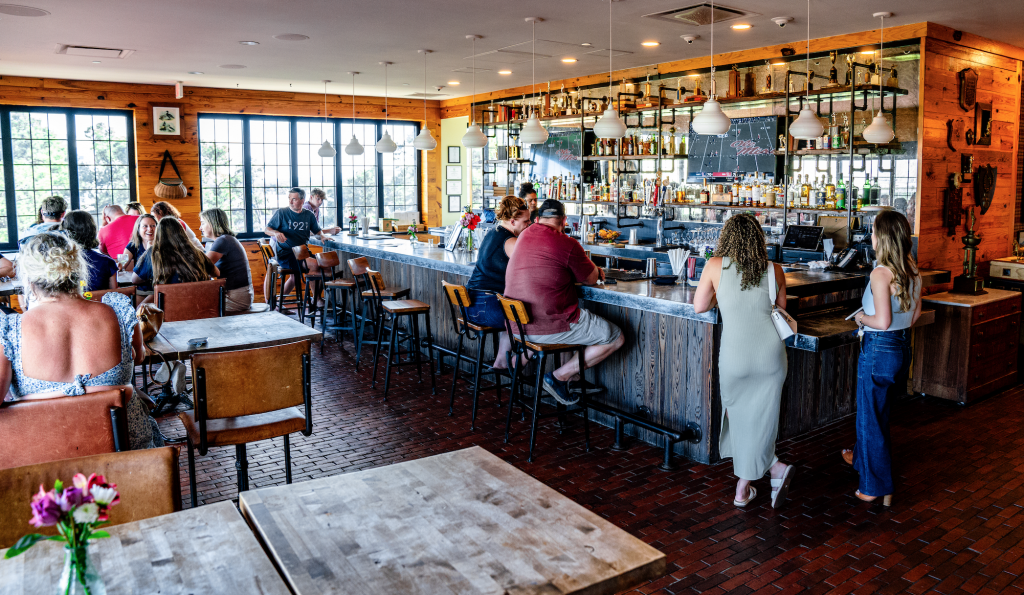
It’s mid-twilight when I wander out from a plaid elevator bank and into Graduate Charlottesville’s Trophy Room. (How did they know I always wanted to drink with L.L. Bean?)
This bar has a balcony nine floors up and I have a draft beer, joining the cafe lights, loveseats, and three enchanted couples. I end up making conversation with a heart-lorn 20-something. He knows someone who works here and he tells me about a girl. They like each other but right now it’s murky. We’re looking at the mountains and the low moon and listening to the hospital helicopters. He should be here with her instead.
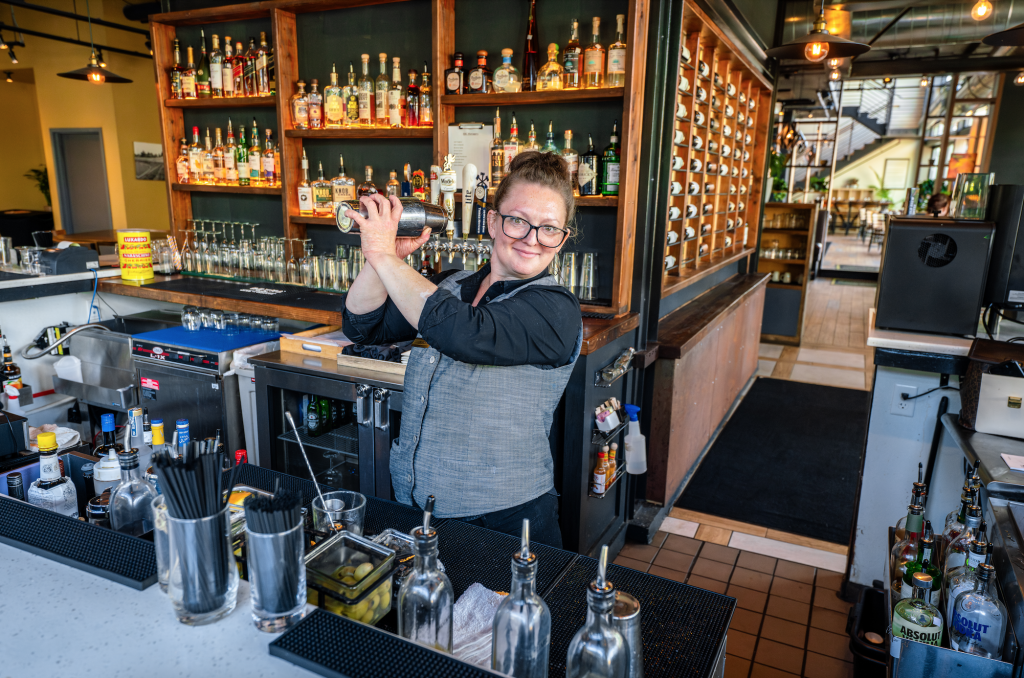
Last call on Thursdays in this town could be later (he writes, selfishly). None of the hotel bars on my schedule are open past 11pm. Two aren’t open past 9. This makes it hard to linger and harder to luxuriate. It’s 20 minutes or so to 10 and I have moseyed to The Draftsman’s bar, The Ridley. I listen to the air conditioning and wait for the bartender. A man and a woman, possibly in love, wait for a cheeseburger. They look like they’ve been at someone else’s outdoor wedding and they’ve just absolutely had it with other people. So they came here, squeezing in, like myself, perhaps a little too close to closing. But there’s always time for a $9 Stella. I covet the cheeseburger—in this burning overhead light, I swear it wants me, too—and remember that last call stalks all of us.
I don’t remember soon enough. The Omni’s Conservatory, my last stop, is already closed.
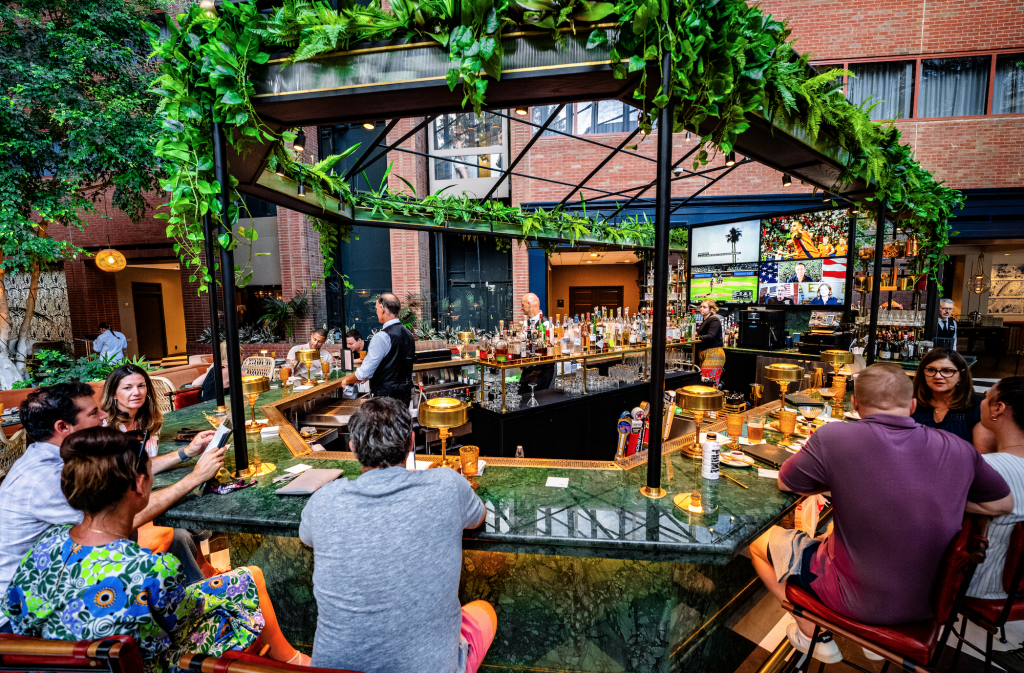
Without checking with Barr, I’m 51 percent sure Ritz and Escoffier would recognize this hotel bar. It’s Friday morning and I’ve returned for normal business hours. Two old men are already drinking. Duty insists that I join them.
It’s an atrium, vast, glassy, and accessibly exotic. At night, there are shadows just where you’d want ’em. Like The Aspen, The Conservatory has an elegant horseshoe bar, but there’s a fountain. I imagine Sydney Greenstreet in a fez and think of my kindly dowager and then someone less ridiculous. Furtive glances could thrive here, too.
She would be stylish and ask what I was writing. I would notice her bangs and ask about something French. Today, though, I’m okay with two old guys and a gentlemanly nod. They seem to know what it is about hotel bars.
